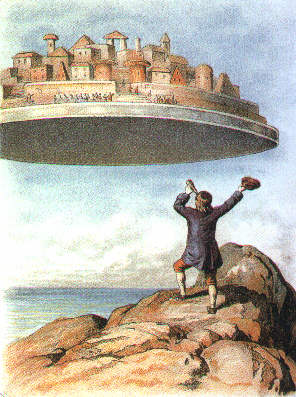
After writing a whole book about internet and narrative control, I want to share what I personally do, in my own limited ways, to try not to get stuck in bubbles. The book covers a lot of ground on this used up road, especially in the last part, but let’s be practical instead. This isn’t meant to be didactic but only informative of my reflection on how I attempt to achieve this and the issues I’ve encountered.
To embark on this journey I require a new instrument that takes the
form of a novel mindset. This mindset isn’t additive but subtractive,
erasing assumptions, biases, and notions that were blotting the map of
the territory I want to explore.
Doing this allows me to slowly extract them from the tool that was
guiding me, and to convert them into helpful keys that I can carry along.
Alnisyan shakel min ashkal 7oriya — 5alil Gebran
Forgetting is a form of freedom
This bartering of meaning making, the joyful discovery of the range of cognitive diversity, is the catalyst that fuels my quest into the depth of the forest of the minds.
While not dwelling on the topic of epistemology, the adventure starts by
dipping my feet into the ways we initially construct these maps.
I advance and glance at the meaning of words, start to pay attention
to them floating around, the different forms and concepts they attract
depending on time and culture.
I try to detach my personality from these meanings, to distance myself,
while noticing how some people gather them like magnet as if they needed
them to float above the water.
These cultural
frustrations
bring with them, when shined upon, the vision of uncomfortable clashes
related to our cultural weaknesses, my own and yours. Yet, through this
enlightenment, their associations weaken.
We all have concepts that come to mind when we hear certain words,
these naughty implicit biases that have been innocuously hammered into
our brains. It isn’t pleasant to hear that your experience is only a
subset of the human one, and that it may not be universal.
I did a couple of online tests related to implicit biases, but
the core questions of the tests themselves seemed to have implicit
biases in them. So I’ve tried bringing more confluence in the meaning
of things to not muster a unique idea when I hear a word.
You can try this exercise yourself: what if I uttered the name of a
country, will you be quick like a Pavlovian dog to bring up pictures
and emotions, a story you’ve told yourself or that you’ve been led
to believe. Is that story linked to the politics of the country you
currently live in? Have there been statistics in the region you live
about such sentiment?
Here’s another exercise, what if some entity or person you currently
love suddenly changed their minds about a topic you you feel strongly
about. What would be your reaction to this change of heart?
What about a scientific research showing the opposite of what you believed?
Similarly, in internet discussions I’d start to notice the heavy
generalizations of the speakers, especially the vociferous ones. Sometimes
so heavy it would be tiresome to always switch footwear with them when
exchanging ideas. Gradually, I would feel as if they were molding me
unto them.
The frustration I felt was normal but I made peace with it and became
accustomed to the different attires of my wardrobe. Yet, I’ve seen some
people slowly be transformed by clothes that weren’t theirs, fusing them
with their identity. A frightening sight!
Hold your identity lightly — Julia Galef
Often I would notice people using abstract words that carry with them their
local meanings with a presumption that this meaning would percolate
anywhere or that the audience would somehow be limited to their peers.
References to concepts that apply only to certain geographical areas,
treaties, states, or countries, such as “the law”, “taxes”, “legality”,
“the government”, “the system”, “our institutions”, the name of a company
or brand, etc..
We all assume the world revolves around us and the people like us. It’s
not easy to write or express oneself in a way that someone, anyone,
would understand. We prefer to write from the inside looking out: we’re
the subject and everything else is an object of observation.
The essence of what I want to do is to have more objects and fewer
subjects, this is what I want to achieve. Externalizing what I’ve
internalized, to be able to share, play, debate, and exchange it
freely. Play is especially important.
The truth is that you don’t have the truth; that you never will.
Travailler, c’est entreprendre de penser autre chose que ce qu’on pensait avant — Foucault
Working, it’s the journey of thinking something else than what we thought of before.
New movements in relation to metamodernism and metathinking are trying
to ink definitions of this exact feeling, to embrace it fully. They
dabble with nebulosity and paradoxes, get comfortable with them, have
uncertainty and non-absolutes as toys.
To see things as a flux of ideas, constantly in iterations to be updated
and mixed.
I have been tinkering a bit on the topic in the past and have been following and reading online blogs and books. Some examples:
- The classic meaningness
- Metarationality
- Metamodernism Manifesto
- Notes on metamodernism (paper)
- Notes on Metamodernism (blog)
- Metamoderna
- Integral Review — A Transdisciplinary and Transcultural Journal For New Thought, Research, and Praxis
- Perspectiva
- The Scout Mindset — Julia Galef
- In Over our heads (The mental demands of modern society) — Kegan
Parts of the metamodern movement presumes the readers are people from Western education and seems to want to offer something for them that is currently missing in their life curriculum (the WEIRD, Western Educated Industrialized Rich and Democratic, as some call them). This renders the movement somewhat flawed. Meanwhile, metarationality is a very useful way of approaching the world that applies everywhere and has existed in countless forms under different names since forever.
Still, nothing beats living this in your day to day life, and this is
close to my particular situation. I live in a country of conflicting
ideologies, like so many others living in true melting pots, mestizos. It
has become second nature to make peace with conflict, to juggle with
it. People have to learn to live in harmony with these concepts and find
a common ground.
One example is the simplistic dichotomy of left and right in politics
that exists in some places but which doesn’t apply where I live. This is
the sort of overarching assumption that many people online often bring
from their own country. When picturing what happens they try to color the
events through the lenses of the system that exists in their minds. In my
country, these simplistic systemic ideas break and don’t match reality,
instead there is a multi-faceted system, a multi-dimensional one. There’s
even a saying that goes like this: “If anybody claims they’ve understood
the situation it means they’re actually far from understanding it”.
This can be extended to many other things, tearing them apart. Not only political ideas, but even going back to the classical philosophical, moral, ethical, religious, or economical questions, avoiding getting stuck in local optima. Questions such as:
- Should the individual come before the collective?
- Are monarchies good for the economy? Do they provide a higher standard of living?
- What is democracy? What are the flavors of democracies? Does there need to be multiple parties fighting for elections to have democracy, a party system? How many parties?
- Is a higher standard of living necessarily related to happiness?
- Does happiness differ through time and space or is it a universal?
- What are human needs? Is the Maslow’s pyramid, or other categorizations of self-actualization, based in reality? Are there counter-examples?
- What is freedom? What does it mean to be free?
These are random teaser questions anyone can ponder on, and that many in the metamodern movement are tackling. The gist is that they put in perspective things we might take for granted. A sort of selective skepticism, or healthy contrarian, or even steel man. Essentially, it is trying to put into words some of the things we wouldn’t normally speak out, displaying in the open the cultural weaknesses that some might have.
Additionally, it is about looking and describing the basic and
boring. What is so close that we’ve stopped paying attention to
it. What dissolved into ourselves, that have become an inherent part of
us. It’s only if I take distance from the mundane that I realize what
it’s about — distance and slow thinking.
It is like becoming an anthropologist of the present, the philosophy of
the everyday routine. As I found out, this isn’t a simple thing to do.
I’ve taken a look at how the scholars of the everyday achieve this
and it’s normally done by questioning repetitive actions we see, or
studying history.
So to stretch this skill, I’ve chosen to get used to it by doing it
with the past and by getting acquainted with different cultures. For
that I’ve been looking at movies and clips from the 1920s and earlier,
and reading or watching documentaries about how people live in different
era or in different spots in the world.
I’ve got a particular fascination about the ones related to modes of
transportations as they show how people get around, do commerce, move,
live, exchange, and interact together. This brings forward the dialectic
of society as a whole.
There can’t be any exchange without language. To shatter more barriers,
it’s good to know multiple languages. This is especially important on the
internet as the language you know instantly puts you in a box. Writing
in English on my blog is itself an assumption about the readers, and
who the readers will assume I am.
Online, it’s not a surprise for anyone that when using the English language
there’s an implicit link with the WEIRD (Western Educated Industrialized
Rich Democratic), which we talked about.
I’ve personally experienced this “language divide” first hand. I currently
speak three languages, learned a fourth in high school (but barely use
it so I can only understand but not speak it properly now), and I am in
the process of learning a new one. The internet differs widely depending
on the language you use, it becomes apparent.
Even the pronunciation of words, what you notice when you hear them,
the sounds, and concepts differ.
Language can wrongly be used to categorize people into reductive groups that don’t define who they are — the classic in-group/out-group bias. Here’s a few expressions, maybe some will highlight your biases too.
- The sinophone world
- The english-speaking world
- The arab-speaking world
- The russian-speaking world
- The francophone world
- The hispanic world
Some act as if these worlds actually existed, when in practice they only exist as a blob without nuance in the minds of the ones that doesn’t speak the language.
To help me I’ve tried multiple translation tools, they’re good friends. However, like any interpretors, not all of them are perfect and they can have bad days, especially when using OCR (scanning an image to find symbols) with languages that have more calligraphic writing.
Regardless, the internet is wonderful and allows to watch movies from around
the world in languages I don’t speak. Even when they are missing
subtitles I can quickly find a good Samaritan that has created subtitle
files for it. Searching for “srt” or “vtt” yields good results.
You can use ffmpeg to convert “vtt” to “srt” and then add them to videos.
ffmpeg -i subtitle.vtt subtitle.srt
ffmpeg -i movie.mp4 -f srt -i subtitle.srt -c:v copy -c:a copy -c:s movie_with_sub.mp4
This has opened a Pandora box of wonderful content which makes me dream of fantastic faraway lands that are closer than ever before. I want to feel more connection, to make myself feel as if I’m everywhere and nowhere, lost in the sublime of humanness and landscapes. For that, I had to try to free myself from the omnipresent Om of the proximity bias.
The first step I took was to keep a globe next to me and set a world
map as my wallpaper. To have it all under my gaze.
Yet, this isn’t enough, as a lot of people know, the Mercator map
projection is a different size than reality; A tool of assumption
like many others.
This makes you consider that proximity bias isn’t necessarily about
proximity but about a selective perception based on measures of
importance to the people living nearby, the businesses, investments,
and politicians — What is important to who.
Looking at projections using other metrics makes this clear. Many
such maps can be found online, such as on the views of the world
website.
Here’s a few examples:
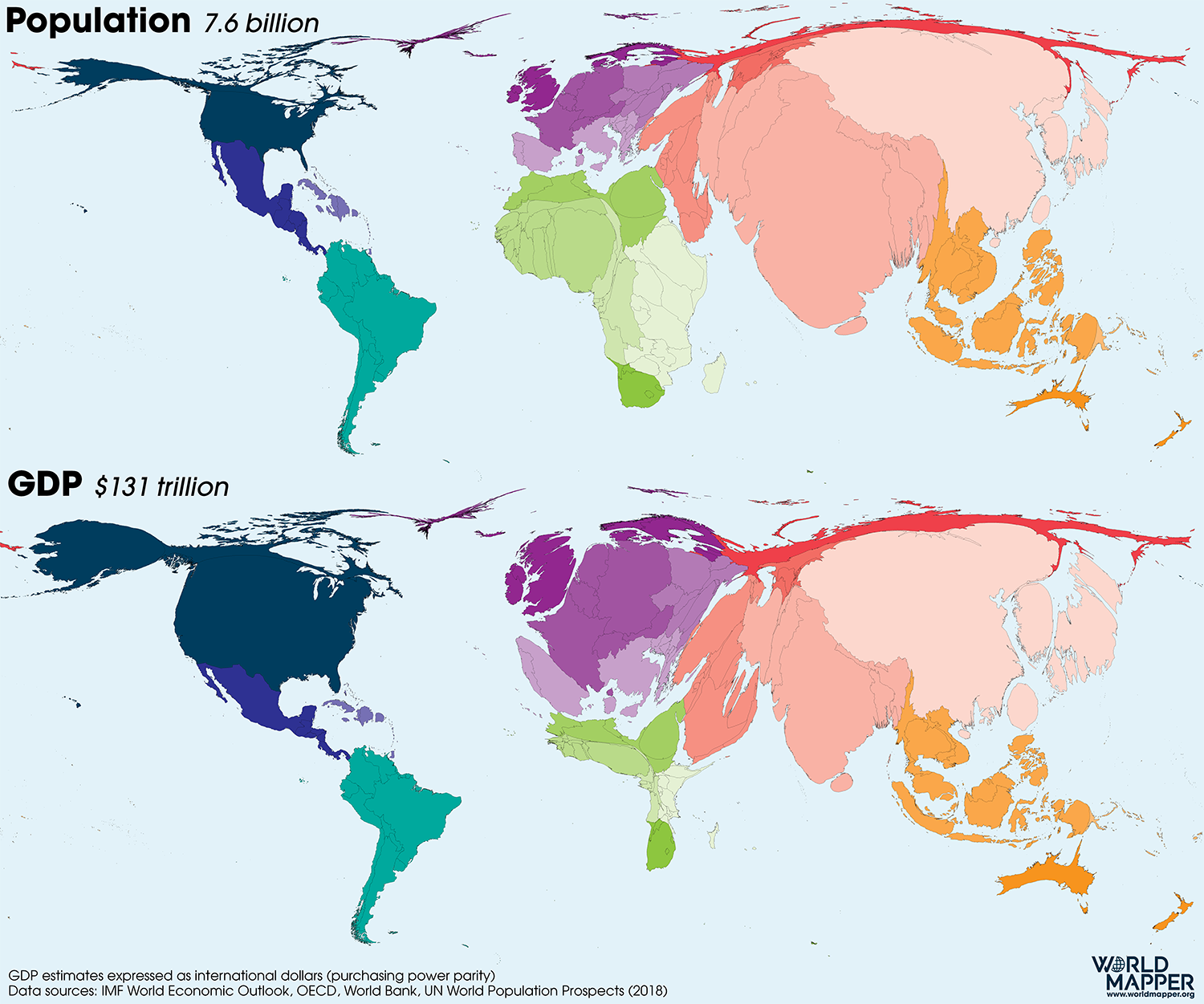
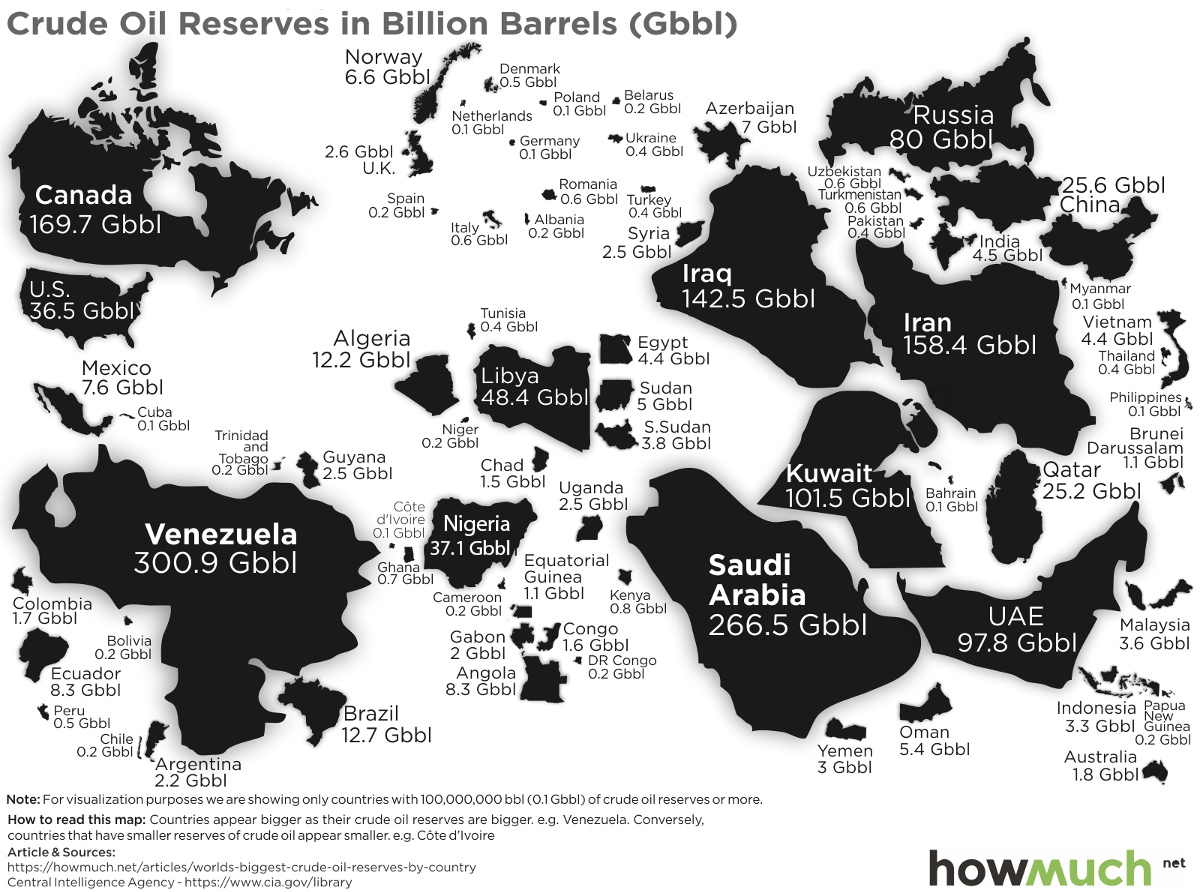
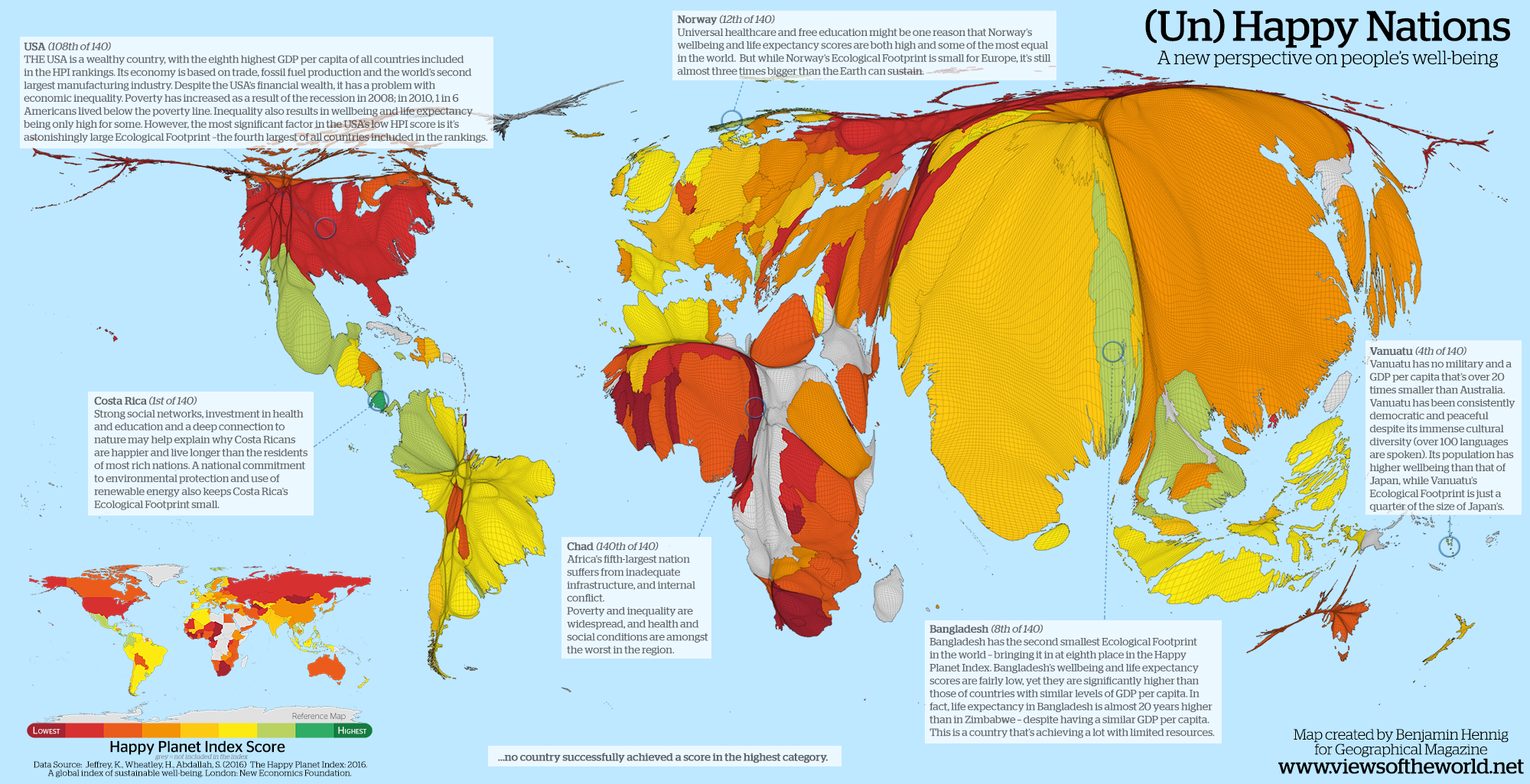
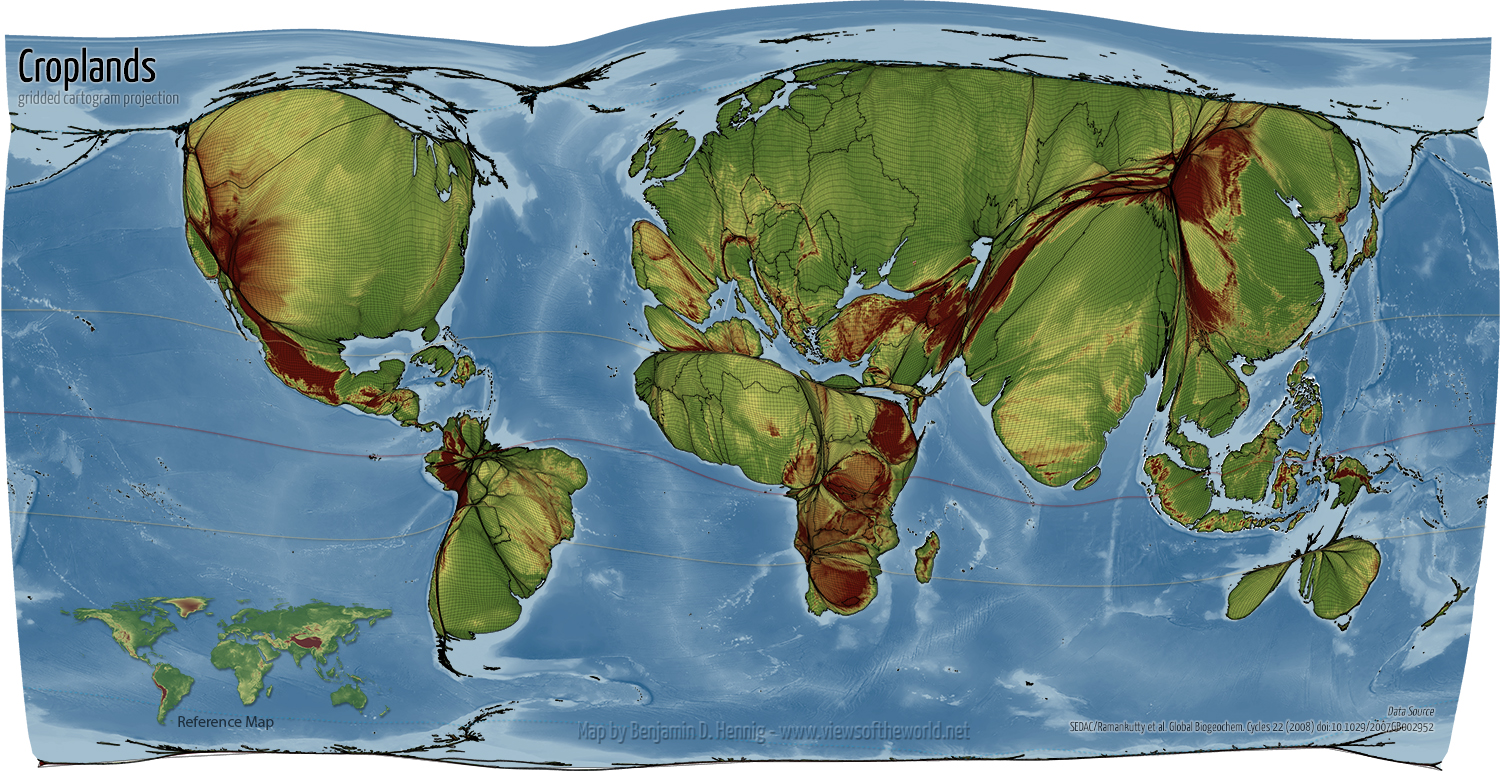
Does a country that have higher numbers in some of these metrics appear more important to the people around you? Do you know the name of the countries with the highest metrics? Is the world only about cold numbers, should you pay attention to them? Why? What should be considered important? Is proximity about metrics?
Another website I spend a lot of time on is Google Map/Earth, which allows easily diving into research about countries.
The second step is related to news, to be able to pay attention to these
corners of the world that would’ve been missed if I only based myself on
the frame of the metrics. My personal solution to that is to create an
RSS feed with news websites from as many of these countries as possible,
especially when they discuss international news.
This alone offers a new perspective on the events of the world, permits
to clearly see the narrative brought forward by certain actors, and to
pay attention to what’s underneath all that.
Objectivity in journalism aims to help the audience make up their own mind about a story, providing the facts alone and then letting audiences interpret those on their own. To maintain objectivity in journalism, journalists should present the facts whether or not they like or agree with those facts. Objective reporting is meant to portray issues and events in a neutral and unbiased manner, regardless of the writer’s opinion or personal beliefs.
…How far are we from this today?
What I ended up with is an RSS feed that gives me around 400 articles in the morning and also 400 in the evening. This may seem colossal but because news are often redundant, it suffices to simply pass through the headlines.
On that note, I’ve also noticed that it’s always better to go for news websites that have the TLD (top-level domain) of the country. Otherwise, the website might be “tainted” and not actually reflecting the reality of that place but one pushed by different state actors (as weird as this sounds).
This also applies to trendy social media, which I personally stay away from, and to tech news.
On social media, instead of regional bubbles, we have bubbles based on
personal interests, political leaning, products preferences, different
definitions of identity, and more.
Similarly, tech news aggregator, such as
HN and lobsters,
are cocoons of their own, they only reflect a very narrow subset of
the tech sphere. For instance, HackerNews is centered around Silicon
Valley companies, especially Apple, tech-related laws, and product
launches à l’Americaine. This needs to be kept in mind when browsing
these websites to understand that the people commenting often have the
point of view of someone located there looking out (or someone that
molded themselves to endorse that), with all that it entails. We’re back
to the topic of subject/object.
The third step relates to media. Along with watching
content from around the globe and through time, the type of content also
matters. I’ve mentioned documentaries but art is also an excellent way
to open horizons.
Today, we’re overloaded with the entertainment business and it has robbed
us of our ability to appreciate art. Is art entertainment, and is all
entertainment art?
Entertainment gives you a predictable pleasure… Art leads to transformation. — Makoto Fujimura
Entertainment makes us feel good. It doesn’t surprise us; it meets our expectations. And that’s why we like entertainment: it coddles us.
But the problem with entertainment is it leaves us unchanged. And we so desperately need to be changed, whether we realize it or not.
Art, on the other hand, transforms us. How? It wounds us — breaks our hearts, causes us to cry, and reveals our own inadequacies.
Art forces us to make a choice. It does exactly what we don’t expect, and that’s how it changes us.
As you can see, this is in touch with the shining upon cultural weaknesses I mentioned before.
And thus, I started visiting online museums, learning about art movements of different ages in different countries, listening to musics I wouldn’t have listened to, reading poems, and watching movies from different film hubs than Hollywood.
I sometimes intentionally dive in folklore when researching topics for
ASCII art pieces. For example, the dragon series, or my latest armour
series where I read about all types of protections homo sapiens used.
The demoscene is wonderful.
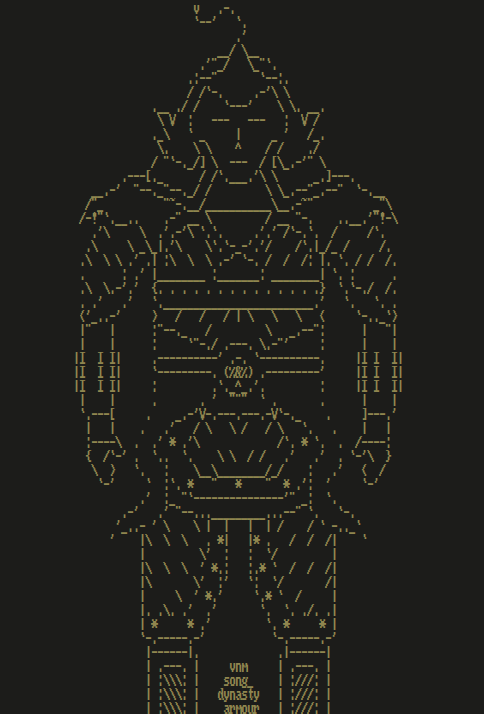
Like many, I spend time on video platforms, especially YouTube. However, I’m aware that the recommendation algorithm has incentives that go counter to diversity. It’s hard to tame it to actually recommend what you like.
What I’ve been trying out is to login and deliberately filter the stream
by only watching what I’m truly interested in and tagging on the home
page videos I don’t want as “not interested” or to stop recommending the
channel that it emerged from.
Yet, even with all that, the algorithm keeps pushing videos I explicitly
don’t want.
- I don’t want music, I don’t got to YouTube for music
- I don’t want “react” videos
- I don’t want any short videos less than 1min
- I don’t want sport videos, yet YouTube has been testing me with all sports that exist on planet Earth
- I don’t want clickbait videos
- I don’t want gaming videos
- I don’t want car videos
- I don’t want craft videos
I’m deeply aware that the algorithm is optimized for viewing
time,
for ads, marketing, and business. This is apparent from the type of
content that gets recommended, which when looked at from a distance has for
purpose to promote and evangelize the consumption of product (games,
widgets, crafts, musics, cars, sport events). Everyone is a brand evangelist
now, reviewing brands and selling lifestyles.
Interestingly, ads don’t match up. I’m getting ads about products that
no locals would be able to buy nor would want to, things that are out
of touch with reality. I found this peculiar, nevertheless interesting.
Aside: Fusion splicer ads kept popping up, I work in a related field but not with the hardware. I was shocked. Then weirdly, one of my friend who started working in networking told me he had one. It might also not help that the whole region is using the same couple of public IPs. Yes, peculiar, but interesting.
Another things I’ve attempted is to change my location on the platform,
selecting different places that speak a language I know or where I could
get good auto-translation. This has helped a bit.
I’ve noticed that French and German YouTube is of much better quality,
less click-bait, more thorough and scientific to a certain limit.
Instead of YouTube, there are many alternative video platforms such as
the archive.org video section, Odysee, or Vimeo. I enjoy visiting them
too, especially archive.org.
However, my main issue with them is that their service is hard to
access. The speed of download and the high quality of the video
formats make them almost inaccessible on my connection. On YouTube I set
the default quality to 144p, but such a quality isn’t available
on most websites.
youtube-dl --format "worst" is my go-to command.
This brings to light how these websites were built for persons that have
the latest and fastest device and network connection.
While, I’m OK with going for a hegemonic USA tech giant like Google for watching a couple of videos, this isn’t the case for searching online.
Searching, seeking information, is the entry point to a multitude of paths for exploration. It’s of high importance that this doesn’t lead to dead ends. It’s incredible how many people aren’t good at properly doing online research.
I’ve honed my googlefu, but now Google keeps spamming me with captchas every time I use it. Maybe because I keep looking beyond the first results that confirm my view, or that I’m extremely picky with niche subjects.
The breadth of results and quality of them has dwindled over time,
especially for non-mainstream q&a search, or for language different than
English. It has become all about shopping on Google, relevant content
is hard to find.
That is why I now mix and match results from different search engines. I
don’t limit myself to a single one.
- Duckduckgo
- Yandex
- Baidu
- Qwant
- Brave
- Searx
- SymbolHound
I’m also considering making my own local search engine or links bin, a digital garden, similar to a discussion we had on nixers.
Let’s end this article by saying that we shouldn’t always dismiss filter
bubbles,
and that we can sometimes get something out of them. It’s about noticing
them and creating bridges between them, even if only for yourself. At
least that’s for the online world, real life is complex, especially
when some people become memeoids, slaves of ideas, templates, speaking
in predictable ways, consumed by their ideologies. We may blame society
for that, but what is a society without its component: us.
Let’s be open to play with ideas for our own
growth.
Have a great day my fellow mind travelers!
An impulsion and compulsion sway and over-master it like a command; a will and a wish awaken, to go forth on their course, anywhere, at any cost; a violent, dangerous curiosity about an undiscovered world flames and flares in every sense. “Better to die than live here” — says the imperious voice and seduction, and this “here,” this “at home” is all that the soul has hitherto loved! A sudden fear and suspicion of that which it loved, a flash of disdain for what was called its “duty,” a rebellious, arbitrary, volcanically throbbing longing for travel, foreignness, estrangement, coldness, disenchantment, glaciation, a hatred of love, perhaps a sacrilegious clutch and look backwards, to where it hitherto adored and loved, perhaps a glow of shame at what it was just doing, and at the same time a rejoicing that it was doing it, an intoxicated, internal, exulting thrill which betrays a triumph — a triumph ? Over what ? Over whom ? An enigmatical, questionable, doubtful triumph, but the first triumph nevertheless; — such evil and painful incidents belong to the history of the great emancipation. — Human, all too human
Attributions:
- Jonathan Swift, Gulliver’s Travels, Leipzig edition, c. 1910
If you want to have a more in depth discussion I'm always available by email or irc.
We can discuss and argue about what you like and dislike, about new ideas to consider, opinions, etc..
If you don't feel like "having a discussion" or are intimidated by emails
then you can simply say something small in the comment sections below
and/or share it with your friends.